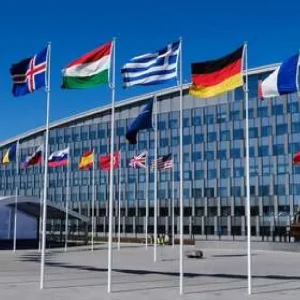
The European Union made an announcement in March that rocked the world of quantum research. It said that going forward, the UK, Israel and Switzerland would no longer be able to participate in the EU’s flagship Horizon Europe science programme in areas that could prove sensitive to national security, including quantum computing and space.
In the same month, the EU’s €1bn quantum research programme chalked up one of its most significant breakthroughs – one that served as a testament to the vibrant internationalism of the field.

Quantum Motion, a UK-based quantum computing start-up led by academics from UCL and Oxford University, demonstrated how state-of-the-art quantum capabilities could be achieved using industrial-grade silicon chips. The project was led by the Spanish PhD student Virginia Ciriano-Tejel and used a device manufactured at CEA-Leti, a French government-funded microelectronics facility in Grenoble.
While the EU’s announcement was met with outcry and may not be implemented in full, it marks a shift towards tech protectionism that is mirrored in different technological spheres across the world. Growing fears over national security, geopolitical grandstanding, and a desire to lead the ‘quantum race’ are complicating international efforts in the field. Quantum researchers warn it has the potential to hobble the pace of discovery.
Matching up global talent and resources is an imperative for the field. “The best people in the world looking at single defects in silicon are in Australia, and the best people in the world carrying out low-temperature research – which you often need for quantum technologies – are in Lancaster,” says Rob Young, director of the Lancaster Quantum Technology Centre and professor at Lancaster University. “If these two people don’t come together, then you never get the best systems studied in the best environment and you never do the best experiment you possibly can.”
Quantum computing research: an international affair
Brexit was likely a factor in the EU’s announcement, perhaps in addition to the fact that nations such as Holland, France and Germany have now established national quantum programmes. Whatever the reasons, it didn’t go over well with scientists. “The nature of physics throws up enough barriers for us already, without these additional geopolitical barriers to work with,” says John Morton, director of the UCL Quantum Science and Technology Institute.
The nature of physics throws up enough barriers for us already, without these additional geopolitical barriers to work with.”
John Morton, UCL Quantum Science and Technology Inst.
The national security implications of quantum technologies emerge from its significance to cryptography. Much of today’s communications is secured by using a protocol that’s based on the difficulty of factoring very large numbers. Universal quantum computers of the future will one day be able to crack those codes easily. But the maturity of a computer that you would need to do that is at least ten years off, says Morton. And in reality, the most sensitive communications by now should have switched to a different type of cryptography protocol, which isn’t known to be hackable in that way.
Nevertheless, desperation to win the race to quantum supremacy has kicked off massive global investment in the field. The US government has announced plans to double R&D spending in non-defence AI and quantum information science by 2022. China does not publicly disclose its overall spend on quantum technologies, but poured $10bn into building the world’s largest quantum research facility in recent years.
Meanwhile, the UK government announced £70m funding “to secure UK position as a world leader in quantum technology” last year, followed by a £153m UKRI fund that UK companies can apply for collaborative research and development or technology projects in quantum.
The battle for quantum computing talent
Geopolitical grandstanding is also stoking the race. As part of his ‘tech cold war’ with China, former US president Donald Trump made it harder for Chinese students to research strategic technologies, including quantum computing, in the US. According to Scott Aaronson, director of the Quantum Information Center at the University of Texas, this is having the desired effect, and frustrating efforts to collaborate with Chinese researchers.
China, by contrast, has recruited thousands of researchers from countries including the US and the UK through initiatives such as its “Thousand Talents Plan”. Sceptics portray this as a means to extract information and knowledge from foreign powers but Young, who holds an adjunct professorship at the University of Electronic Science and Technology in Chengdu, China, doesn’t agree. He says the Thousand Talents programme rewards open publishing in prestigious science journals, and that a lot of Chinese research is done very publicly. “I think China’s main mission is just to be seen as being the best externally,” says Young.
The plan appears to be working. International enrolments in Chinese universities rose from 52,000 in 2000 to almost 500,000 in 2018. The Chinese Academy of Sciences has the highest publication output in the field of quantum computing. The rest of the top ten institutes are located in China, France (via the CNRS laboratories), Canada, the US, the UK and Singapore.
“In the area of quantum computing, the bottleneck, more than funding… is about who’s going to be able to attract the talent,” says Morton. He says this is more important than which country is pouring the most money into the field. The UK, for example, has managed to punch above its weight thanks to its ability to attract the best candidates from abroad. As a result of Brexit, however, EU students now have to pay thousands more in fees, “and that’s detrimental because often international students that come to the UK are attracted by the world-class universities,” says Morton. “That’s the entry drug into the UK.”
Informal collaboration on quantum computing research
The UK has not followed the US in attempting to restrict quantum collaboration with China yet, says Young. And while countries typically direct research funds towards institutions within their borders (although he has, for example, secured two US Air Force funded projects), organic collaboration is still flourishing.
“The informal side where scientists just meet, share ideas, jointly author papers – I think that side of things is much more difficult to control,” says Young. “There’s no doubt that that will still happen: samples will still be sent between Europe and the UK and China and America. Those things happen all the time. There’s no research funding supporting that, just a desire to do fantastic research.”
International restrictions on quantum collaboration are more likely to affect applications of the technology than pure research. The UK has placed export controls on a range of strategic military and dual-use items. A number of quantum technologies, including quantum cryptography, have to be approved before being sent abroad and scientists can be put in prison if they disclose an invention without approval. “That’s something that I have to worry about at the Quantum Technology Centre at Lancaster,” says Young. “We’ve already put one technology through and had it approved rather easily, but it’s certainly an extra hurdle that we have to jump over.”
Where military applications dominate, and the spectre of national security arises, red tape tends to proliferate. However, these military applications may have actually been oversold by quantum researchers themselves, sometimes to get funding and push quantum higher on the political agenda, says Young.
I fear that many of the great powers’ military [or] national security investments in quantum computing are based on fundamental misconceptions about what quantum computers will be able to do.
Scott Aaronson, University of Texas
“More fundamentally, I fear that many of the great powers’ military [or] national security investments in quantum computing, just like many of the commercial investments in quantum computing, are based on fundamental misconceptions about what quantum computers will be able to do and how quickly they’ll be able to do it,” says Aaronson. He adds that very few serious experts believe that quantum computers will revolutionise AI, machine learning, and optimisation over the next decade or two.
The idea of a ‘quantum race’ has proved both a burden and boon to the field, according to the researchers interviewed for this article. On the one hand, it’s helped to inflate government budgets for quantum research, but it has also come with the added dose of national security paranoia.
The quantum ‘race’: help or hindrance?
“A lot of governments and companies have set themselves up for huge disappointment, once the marketing pitches collide with the reality, and it will render moot a lot of horse-race analysis about whether the US is ahead of China or vice versa, in realising applications that aren’t going to be realised period,” says Aaronson.
But there may still be some upsides of the excitement of a ‘race’ says Young, who compares it to the space race of the latter half of the 20th century between the US and the USSR. “Was it a good thing or a bad thing? The problem is, we don’t do the control experiment, we never get to see what the world would have looked like if we didn’t have the space race, but I think it’s quite easy to make an argument that it was,” he says.
“I welcome competition. I think if everybody was just working harmoniously with everybody else, then the drive to do something better and achieve something better wouldn’t be as strong, and that would be a shame,” says Young. “I think you have to capture that somehow.”






